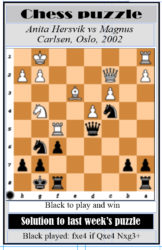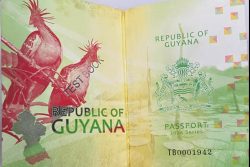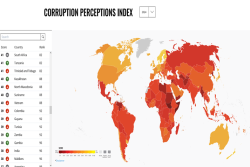The Guyana Chess Federation (GCF) has decided upon a 2016 Guyana Olympiad chess team without hosting a qualification competition to determine the competence of its participants. Unlike the traditional four-year Olympic Games cycle, the chess Olympiad is held biennially. The previous chess Olympiad, therefore, was held in 2014. Minus a women’s chess team which Guyana is fielding for the first time, the male team members are homogenous as in the 2014 edition, in addition to a new face.
 It’s as if the propulsion of Guyana’s chess became impeded over the past three years. It’s as if the identical persons were playing chess during the period from 2014 to the present. If there were other men and women playing competitive chess in Guyana, and I suspect there were, why were they denied an opportunity to compete for transparent qualification to the Olympiad? Chess was not meant to be promoted in such a dark, ineffective and opaque manner. The founder of the GCF and its initial president was pellucid in his contention that the game of chess is for everyone. But how can we take chess to the masses without the involvement of the school system?
It’s as if the propulsion of Guyana’s chess became impeded over the past three years. It’s as if the identical persons were playing chess during the period from 2014 to the present. If there were other men and women playing competitive chess in Guyana, and I suspect there were, why were they denied an opportunity to compete for transparent qualification to the Olympiad? Chess was not meant to be promoted in such a dark, ineffective and opaque manner. The founder of the GCF and its initial president was pellucid in his contention that the game of chess is for everyone. But how can we take chess to the masses without the involvement of the school system?
The chess administration is obliged to make the first move. Hosting a schools’ competition promises to be an effective way of propelling the country’s chess. If we postpone such an activity, we will be surrounded by the same old faces to whom we have grown accustomed, and the expansion of the game would be stifled. We have to create new faces in order to identify a possible grandmaster within our midst, or, perhaps, identify a few players who demonstrate promise, and can excel within the Caribbean.

In this new golden age of the internet and internet chess, it wouldn’t take an interminable period for our students to learn the intricacies of the rich ancient game. Since we are noted for excelling in academia, we can learn and excel at chess. We understand computers, and certainly, we can realize grandmasters. Computers have been with us since the 1940s, and scientists gravitated to chess as a way of testing their calculating abilities. The game represents a collection of challenging problems for minds and machines. It has simple rules and so is perfect for such experiments.
Over the years, humans were fond of opposing chess computers, and the computers lost. Now all of that has changed. Computers have moved ahead of humans in chess. Twenty years ago in 1997, I was startled when Deep Blue defeated world chess champion Garry Kasparov. Time carried the story and it was written by the Pulitzer Prize winner Charles Krauthammer. What he said was interesting. It wasn’t just that Deep Blue won, he wrote, but how he won. The computer appeared to play in an almost human fashion. Deep Blue had passed a threshold of artificial intelligence which should worry people, Krauthammer noted. There is a lot to learn in the relationship between man and the computer and chess.
Meanwhile, the column wishes to announce the candidacy of businessman Dennis Dillon of Tuschen, for the post of president of the Guyana Chess Federation. The column takes the opportunity also to wish the Guyana Olympiad chess team well in Baku.
Chess games
The following games were played at the Your Next Move Blitz Tournament in Leuven, Belgium, from June 17 – 20, 2016. World chess champion Magnus Carlsen won the tournament.
White: Magnus Carlsen
Black: Fabiano Caruana
- d4 Nf6 2. c4 e6 3. Nc3 Bb4 4. Nf3 c5 5. g3 cxd4 6. Nxd4 Ne4 7. Qc2 Qa5 8. Bg2 Nxc3 9. O-O Nc6 10. bxc3 Bxc3 11. Nb3 Nd4 12. Nxd4 Bxd4 13. Rb1 d6 14. Bb2 Bxb2 15. Qxb2 O-O 16. Rfd1
 Rd8 17. Rd3 e5 18. Rbd1 Be6 19. Qxb7 Rab8 20. Rxd6 Rdc8 21. Qe7 Re8 22. Qh4 Qxa2 23. Bc6 Rf8 24. Qe7 h6 25. Rxe6 fxe6 26. Rd7 Qb1+ 27. Kg2 Qg6 28. f3 Rb2 29. Kf2 Qf6 30. Rxa7 Rc2 31. Qxf6 Rxf6 32. Ra4 Rf7 33. Be4 Rc1 34. Bg6 Rf8 35. h4 Rc8 36. Bd3 e4 37. Bxe4 R1xc4 38. Ra6 Kf7 39. h5 R4c7 40. Bg6+ Ke741. f4 Rc6 42. Ra2 Rc5 43. Kf3 Kf6 44. Kg4 e5 45. Bf5 R8c7 46. Ra8 exf4 47. gxf4 Rc1 48. Bg6 Rg1+ 49. Kf3 Re1 50. Rf8+ Ke6 51. Re8+ Kd6 52. Kg4 Re7 53. Rd8+ Kc7 54. Rg8 R1xe2 55. Kf5 Rc2 56. Ra8 Rc5+ 57. Kg4 Kd6 58. Ra6+ Rc6 59. Ra4 Rec7 60. Rd4+ Ke7 61. Re4+ Kf6 62. Re8 Rc4 63. Rf8+ Ke7 64. Rf5 Kd6 65. Rf8 Re7 66. Kf5 Rc5+ 67. Kg4 Kd5 68. Rd8+ Kc4 69. Bd3+ Kc3 70. Bg6 Rc4 71. Rd3+ Kb4 72. Rd8 Ra7 73. Bd3 Rc5 74. Bg6 Kc3 75. Rd3+ Kc4 76. Rd8 Rd5 77. Re8 Kd4 78. Re4+ Kc5 79. Re8 Rd4 80. Rc8+ Kb4 81. Rb8+ Kc3 82. Re8 Raa4 83. Rf8 Kd2 84. Kf3 Ra3+ 85. Kg4 Raa4 86. Kf3 Ra7 87. Kg4 Ra6 88. Kf5 Ke3 89. Re8+
Rd8 17. Rd3 e5 18. Rbd1 Be6 19. Qxb7 Rab8 20. Rxd6 Rdc8 21. Qe7 Re8 22. Qh4 Qxa2 23. Bc6 Rf8 24. Qe7 h6 25. Rxe6 fxe6 26. Rd7 Qb1+ 27. Kg2 Qg6 28. f3 Rb2 29. Kf2 Qf6 30. Rxa7 Rc2 31. Qxf6 Rxf6 32. Ra4 Rf7 33. Be4 Rc1 34. Bg6 Rf8 35. h4 Rc8 36. Bd3 e4 37. Bxe4 R1xc4 38. Ra6 Kf7 39. h5 R4c7 40. Bg6+ Ke741. f4 Rc6 42. Ra2 Rc5 43. Kf3 Kf6 44. Kg4 e5 45. Bf5 R8c7 46. Ra8 exf4 47. gxf4 Rc1 48. Bg6 Rg1+ 49. Kf3 Re1 50. Rf8+ Ke6 51. Re8+ Kd6 52. Kg4 Re7 53. Rd8+ Kc7 54. Rg8 R1xe2 55. Kf5 Rc2 56. Ra8 Rc5+ 57. Kg4 Kd6 58. Ra6+ Rc6 59. Ra4 Rec7 60. Rd4+ Ke7 61. Re4+ Kf6 62. Re8 Rc4 63. Rf8+ Ke7 64. Rf5 Kd6 65. Rf8 Re7 66. Kf5 Rc5+ 67. Kg4 Kd5 68. Rd8+ Kc4 69. Bd3+ Kc3 70. Bg6 Rc4 71. Rd3+ Kb4 72. Rd8 Ra7 73. Bd3 Rc5 74. Bg6 Kc3 75. Rd3+ Kc4 76. Rd8 Rd5 77. Re8 Kd4 78. Re4+ Kc5 79. Re8 Rd4 80. Rc8+ Kb4 81. Rb8+ Kc3 82. Re8 Raa4 83. Rf8 Kd2 84. Kf3 Ra3+ 85. Kg4 Raa4 86. Kf3 Ra7 87. Kg4 Ra6 88. Kf5 Ke3 89. Re8+
Kf3 90. Rb8 Rd5# 0-1.
White: Levon Aronian
Black: Wesley So
- Nf3 d5 2. c4 c6 3. g3 Nf6 4. Bg2 dxc4 5. O-O Nbd7 6. Qc2 Nb6 7. Na3 Be6 8. Ne5 h5 9. Naxc4 Nxc4 10. Nxc4 h4 11. Ne5 hxg3 12. hxg3 Rc8 13. d4 Bd5 14. e4 Bxe4 15. Bxe4 Qxd4 16. Nxf7 Kxf7 17. Bg6+ Kg8 18. Rd1 Qe5 19. Bf4 Qa5 20. Bf5 g5 21. Bxc8 Kg7 22. Be3 1-0.
White: Viswanathan Anand
Black: Magnus Carlsen
- e4 e5 2. Nf3 Nc6 3. Bc4 Bc5 4. O-O Nf6 5. d3 d6 6. c3 a6 7. a4 Ba7 8. Na3 Ne7 9. Nc2 O-O 10. Be3 Bxe3 11. Nxe3 a5 12. Re1 Ng6 13. Bb3 c6 14. Bc2 Re8 15. d4 Qc7 16. dxe5 dxe5 17. g3 h6 18. Qe2 Be6 19. Red1 Rad8 20. b4 Nf8 21. Nc4 axb4 22. cxb4 Bg4 23. Rxd8 Qxd8 24. Rd1 Qe7 25. Rb1 Ne6 26. Ncxe5 Nd4 27. Qd3 Nxf3+ 28. Nxf3 Qxe4 29. Qxe4 Nxe4 30. Rb3 Nf6 31. Kg2 Be6 32. Ra3 Bd5 33. Kf1 Ng4 34. h3 Bxf3 35. hxg4 Bxg4 36. Kg2 Kf8 37. Rc3 Rd8 38. b5 cxb5 39. axb5 Rc8 40. Rxc8+ Bxc8 41. f4 Ke7 0-1.







